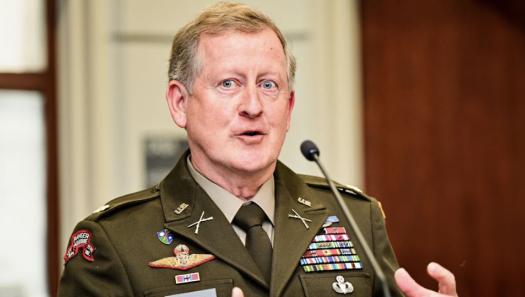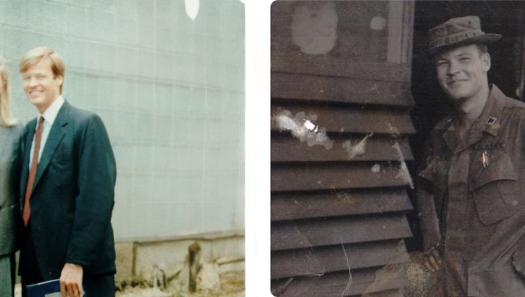Military & Veterans News
Vet News: Administration Seeks $63.6 Billion for VA
Department of Defense press release via Veterans News and Information Service

WASHINGTON -- Secretary of Veterans Affairs Anthony J. Principi announced details today of President Bush's proposed $63.6 billion fiscal year 2004 budget for the Department of Veterans Affairs (VA), which includes a 7.4 percent increase in discretionary funding over the current year's expected budget.
"I am gratified with the budget proposed by President Bush for fiscal year 2004," Principi said. "America's Veterans deserve the best health care and compensation system we can provide. This budget allows VA to fulfill its obligation to serve today's Veterans, to continue as a leader in medical research and to ensure America is prepared to serve the needs of future Veterans. In a period of tough budget choices, President Bush again has shown his support for Veterans."
Fiscal year (FY) 2004 begins Oct. 1, 2003. Discretionary appropriations are budgetary resources controllable through the congressional appropriation process and include funds to support VA's health care system. Mandatory spending refers to budgetary resources that are provided for entitlement programs such as Veterans' compensation and pension payments.
Overall, the budget provides $30.2 billion in discretionary funding and $33.4 billion for entitlements. It provides VA with $3.2 billion more than the expected FY 2003 level to operate the nation's largest health care system, help disabled Veterans, provide annuities for widows, maintain GI Bill educational benefits and home loan guarantees and honor Veterans when they die.
To address VA's priorities, the budget requests $28.4 billion for medical and research programs, a $2 billion increase; $33.7 billion for Veterans' benefits programs (including administrative costs), a $340 million increase; and $428 million to support the department's burial program, an $18 million increase.
The budget request includes funding for compensation programs ($26.8 billion), pension programs ($3.5 billion), education programs ($2.0 billion), vocational rehabilitation and employment ($697 million), insurance ($33 million), housing program ($547 million) and medical and prosthetic research ($822 million). Also included is $225 million for VA's Capital Asset Realignment for Enhanced Services (CARES) nationwide infrastructure initiative to ensure that the department can deliver services where Veterans live.
Additionally, the requested budget supports VA's critical role in response to national emergencies and provides support to community and faith-based organizations that care for homeless Veterans.
Improving VA's Claims Processing Timeliness
The budget request supports the president's and Principi's goal of continuing VA's progress in reducing the time Veterans must wait to get decisions on their claims. The department expects to reach its claims processing timeliness goal of 100 days by the end of FY 2003 and maintain that standard in FY 2004. VA decided approximately 68,400 claims a month for the past year, compared with 40,000 a month the previous year. As a result, VA has reduced its inventory of pending disability claims to about 320,000, down from a peak of 430,000 a year ago, despite receiving about 60,000 new claims each month.
A team formed late in 2001 to process claims of older Veterans and those that have been pending for more than a year has completed nearly 75,000 claims, including those of nearly 20,000 Veterans age 70 and older. The department's goal is to adjudicate more than 83,000 of these claims by March 2003.
The budget provides funding for 12,720 full-time Veterans' benefits program employees and includes $53.7 million for new and continuing initiatives to improve the timeliness and accuracy of the department's claims processing system.
Proposed funding for VA-administered entitlement programs includes an estimated cost-of-living adjustment of 2.0 percent in compensation and pension programs that would take effect Dec. 1, 2003. Changes in the Consumer Price Index will determine the actual amount.
The requested budget ensures that the Montgomery GI Bill continues to provide educational benefits for Veterans. Since 1944, when the first GI Bill was passed, more than 20.9 million Veterans, servicemembers and family members have received $75 billion in GI Bill benefits for education and training. VA also has assisted in the education of more than 750,000 dependents of Veterans whose deaths or total disabilities were service-connected. In 2002, VA helped pay for the education or training of about 325,000 Veterans and active-duty personnel, 86,000 reservists and National Guardsmen and 54,000 survivors.
Veterans Health Care
This year's budget request continues President Bush's commitment to improve access to quality health care and services by allocating $27.5 billion for VA's health care system. This figure includes nearly $2.1 billion of collections from third-party health insurance and co-payments from Veterans. This is a $2.0 billion increase in estimated spending for health care compared to this year's expected budget.
More than 6.6 million Veterans currently are enrolled in VA's health care system. VA expects to treat 66 percent more patients in FY 2003 than we did in 1996. This increase, mostly from nonservice-connected Veterans, significantly reduced the department's ability to treat patients in a timely manner, including the highest priority Veterans -- those with service-connected conditions, those with lower incomes and those with special health care needs, such as blindness, amputations or spinal cord injuries. This year's budget request includes proposals that will enable VA to better serve this core constituency of Veterans.
The department expects to treat 4.8 million individual patients in FY 2004 and to continue reducing the waiting time for Veterans to be seen by a health care professional. VA will achieve its target of 30 days to be seen in a primary care clinic and eliminate waiting lists.
"Last year, VA treated 1.6 million more patients with 20,000 fewer employees than in 1996," said Principi. "Nonetheless, this department leads the nation in many important areas, such as patient safety, computerized patient records, telemedicine, rehabilitation and research. I not only want to see this standard continue, I intend to see it get even better."
The proposed $27.5 billion for the medical care program represents a 7.7 percent increase over this year's expected level. This, together with a comprehensive set of legislative and regulatory proposals will allow VA to focus its health care assets on providing medical care to Veterans who need it most.
These proposals include increasing primary care and pharmacy co-payments for Veterans in priority groups 7 and 8, establishing an annual enrollment fee for nonservice-connected Veterans in enrollment priority group 7 and all Veterans in priority group 8 and eliminating pharmacy co-payments for Veterans in priority groups 2 through 5 with incomes below $16,000. The department is working with the Department of Health and Human Services (HHS) to develop a plan that will provide non-enrolled priority group 8 Veterans the option of using their Medicare benefits to obtain their care from VA.
National Cemeteries as National Shrines
"VA's core mission is to care for those who have borne the battle," said Principi. "We must assure America that her sons and daughters who so proudly served in times of war and peace will forever be honored in national cemeteries that are recognized as national shrines."
The budget request includes $144.2 million to operate the department's national cemeteries and to maintain them in a manner befitting their status as national shrines. The operating funds include $4.3 million for the activation and operation in 2004 of five new national cemeteries in Fort Sill, Okla.; Atlanta; South Florida; Pittsburgh and Detroit.
VA cares for approximately 2.5 million graves under its jurisdiction in 39 states and Puerto Rico. There were more than 89,000 interments in VA national cemeteries in FY 2002. National cemetery interments are expected to peak at an estimated 110,000 annually in 2008.
Requested cemetery construction projects total $76.9 million, including the development of a new cemetery in the Detroit area, and expansion and improvement of cemeteries at Fort Snelling, Minn., and Barrancas, Fla. An additional $32 million is requested for the State Cemetery Grants Program.
Grants for States and Territories
The FY 2004 budget request included $102 million for the State Extended Care Program which provides matching grants for the capitalization of state or territory owned and operated Veterans extended care facilities. It also included $32 million for grants for development of State owned and operated veteran cemeteries.
Business Practices
In FY 2003, VA established a Business Oversight Board to examine the department's major business processes and explore ways to bring them in line with industry standards. The department also is working with the Department of Defense (DoD), the Office of Management and Budget (OMB) and HHS to define common measures for health care. VA is also working with OMB and the Departments of Labor, Housing and Urban Development, Education and Interior to define common job training and employment measures.
With annual spending of about $6 billion, VA is the second largest purchaser of goods and services in the federal government after DoD, yet ranks sixth in procurement overhead costs. Procurement initiatives begun last year will extend the department's buying power for its health care system even more. The reforms include standardizing the purchase of items used throughout the system, pursuing more opportunities for joint purchasing with DoD and advocating the government-wide use of Universal Product Numbers to improve inventory management.
VA and DoD have embarked on a historic effort to improve cooperation and sharing between the departments in a number of areas, including improved records sharing and joint physical examinations to improve the Veterans claims process for military personnel. Additional areas of VA-DoD cooperation include computerized patient medical records, consolidated pharmaceutical mailings, and joint physical examinations for separation and disability claims.
The FY 2004 budget represents a milestone in the integration of the department's budget and performance information, featuring budget account restructuring and government-wide measurements. The budget contains a significantly lower number of accounts (nine) than in previous years, distributes capital costs among them, requests mandatory and discretionary funding within each account, and maintains some non-appropriated accounts, such as trust funds, separately.
VA's health care system infrastructure realignment will continue in 2004 under the CARES initiative. The CARES strategic planning process will enable VA to position its capital assets where they are needed most. More important than the cost savings to VA will be the improved availability of VA services to Veterans, regardless of where they live. Savings realized by VA will be reinvested into direct health care service improvements.
The FY 2004 budget request includes $1.5 billion to support VA's information and technology (IT) operations. It includes $10.1 million for the continued development of the One-VA Enterprise Architecture (EA), designed to streamline and unify VA's information technology efforts. Also included is $26.5 million for cyber security initiatives to protect VA's IT assets nationwide.
"I am excited to join President Bush in presenting this budget," said Principi. "It ensures that the Department of Veterans Affairs will continue to provide America's Veterans with the benefits and health care services they have earned. This budget keeps our nation's promise 'to care for him who shall have borne the battle, and for his widow and orphan.' "
SOURCE: Department of Defense press release via Veterans News and Information Service


